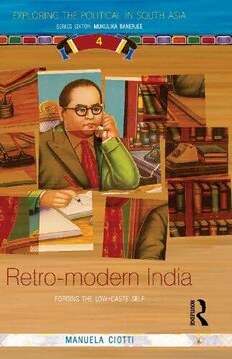
Retro-modern India: Forging the Low-caste Self PDF
Preview Retro-modern India: Forging the Low-caste Self
Retro-modern India ii Retro-modern India Exploring the Political in South Asia Series Editor: Mukulika Banerjee Reader in Anthropology, London School of Economics Exploring the Political in South Asia is devoted to the publication of research on the political cultures of the region. The books in this Series will present qualitative and quantitative analyses grounded in fi eld research, and will explore the cultures of democracies in their everyday local settings, specifi cally the workings of modern political institutions, practices of political mobilisation, manoeuvres of high politics, structures of popular beliefs, content of political ideologies and styles of political leadership, amongst others. Through fi ne- grained descriptions of particular settings in South Asia, the studies presented in this Series will inform, and have implications for, general discussions of democracy and politics elsewhere in the world. Also in this Series The Vernacularisation of Democracy: Politics, Caste and Religion in India Lucia Michelutti ISBN: 978-0-415-46732-2 Rise of the Plebeians? The Changing Face of the Indian Legislative Assemblies (Eds) Christophe Jaffrelot and Sanjay Kumar ISBN: 978-0-415-46092-7 Broadening and Deepening Democracy: Political Innovation in Karnataka E. Raghavan and James Manor ISBN: 978-0-415-54454-2 Retro-modern India Forging the Low-caste Self Manuela Ciotti LONDON NEW YORK NEW DELHI iv Retro-modern India First published 2010 by Routledge 912 Tolstoy House, 15–17 Tolstoy Marg, New Delhi 110 001 Simultaneously published in the UK by Routledge 2 Park Square, Milton Park, Abingdon, OX14 4RN Routledge is an imprint of the Taylor & Francis Group, an informa business © 2010 Manuela Ciotti Typeset by Star Compugraphics Private Limited D–156, Second Floor Sector 7, Noida 201 301 Printed and bound in India by Sanat Printers 312, EPIP, Kundli Sonepat 131 028, Haryana All rights reserved. No part of this book may be reproduced or utilised in any form or by any electronic, mechanical or other means, now known or hereafter invented, including photocopying and recording, or in any information storage and retrieval system without permission in writing from the publishers. British Library Cataloguing-in-Publication Data A catalogue record of this book is available from the British Library ISBN: 978-0-415-56311-6 Ai miei genitori, per tutto (To my parents, for everything) Contents Orthography and Transliteration viii Glossary of Selected Terms ix Foreword by Mukulika Banerjee xiii Acknowledgements xvii Chapter 1. Chamar Modernity: Progressing into the Past 1 Chapter 2. ‘Today We Can Touch Anything’: Refl ections on the Crux of Identity and Political Economy 52 Chapter 3. Ethnohistories behind Local and Global Bazaars: Chronicle of a Weaving Community and its Disappearance 82 Chapter 4. ‘We Used to Live like Animals’: Education as a Self- and Community-engineering Process 118 Chapter 5. Nonrational Modernity? Religious Agency, Science and Spirits 146 Chapter 6. Beyond the Vote: Politics as Sociality, Imagination and Identity 170 Chapter 7. The Bourgeois Woman and the Half-naked one: Gendering Retro-modernity 212 Chapter 8. The Politics of Indian Modernity 247 Bibliography 263 About the Author 282 Index 283 viii Retro-modern India Orthography and Transliteration In the transliteration of Hindi words I have given preference to the sound of the words rather than to the rules of Sanskrit orthography. As a result, I have omitted the fi nal ‘a’ from a number of words. The English plural form ‘s’ is often added to Hindi words to aid the fl ow of the text. When the possessive form for a Hindi word is required, the ‘s’ following the apostrophe appears in non-italicised form. However, for words widely used in Indological literature and for works on Hinduism, I have chosen the textual written form rather than the spoken one. I have also used this form for the names of places, people, communities, and religious buildings. All other Hindi words used in the text appear in italicised form, but frequently occurring Hindi words have been italicised only the fi rst time they appear in the book. The glossary contains the words that appear several times in the main body of the text and for these, diacritical marks are given. Words used infrequently are translated as they arise, and in some cases this translation is repeated in subsequent chapters to aid the reader. Glossary of Selected Terms achu¯t Untouchable adharma Unrighteousness, immorality adhya¯ Sharecropping andhvishva¯s Superstition bahujan sama¯j The majority ba¯ni Weft; weaving putting-out system basti Hamlet ba¯za¯r Market bhakti Devotion, love (especially for a deity) bhu¯t-pret Ghost bigha¯ Land measurement unit. 1.5 bigha¯ are equal to 1 acre. A bigha¯ is subdivided into 20 biswas. bira¯da¯ri Caste brahm The vengeful spirit of a Brahmin who died a bad death chaudhr¯ı Headman cha¯i Tea da¯¯ı Midwife da¯n Unreciprocated gift deha¯t Inner countryside dharma Religious and moral duty dih ba¯ba¯ Presiding deity of the village fa¯ida¯ Benefi t, advantage, interest gya¯n Knowledge, understanding, wisdom girhast Master weaver gotra Lineage gra¯m pradha¯n Village chief gula¯m Slave ha¯rwa¯ha¯ Ploughman izzat Honour ja¯nka¯r¯ı Information, knowledge ja¯ti Caste ja¯tiva¯d Casteism kacca¯ ma¯l Raw material x Retro-modern India kala¯ Art ka¯m Work karhai Embroidery ka¯rkha¯na¯ Workshop karma Action, deed and its consequences in this or subsequent lives katha¯ Story kela Viscose khara¯b Bad kothida¯r Owner of fi rm, businessman laga¯n Revenue or rent laukik Popular practice, not sanctioned by texts lota¯h Metal vessel for drinking water mah¯ın ka¯m Fine work maulv¯ı One learned in Muslim law, i.e., a religion specialist mazdur¯ı Wage labour mohalla¯ Neighbourhood mota¯ ka¯m Coarse work na¯r¯ı bharna¯ To reel the bobbins naukar¯ı Government service ojha¯ Exorcist pakka¯ Made of brick pa¯n Betel leaf, nut and condiments pancha¯yat Council pandit Brahmin priest pa¯p Sin parampara¯ Tradition parda¯h Literally, curtain; seclusion regime parha¯-likha¯ Literate, educated prasa¯d Blessed food given to the worshippers after puja has taken place puja¯ Worship puja¯r¯ı Worship specialist qasba¯ Rural market town raj Kingdom ra¯ja¯ ka¯ ka¯m King’s work sama¯j Community
